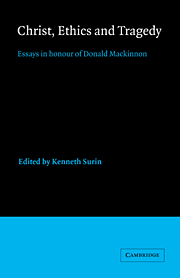Book contents
- Frontmatter
- Contents
- Preface
- Donald MacKinnon
- 1 Theological rhetoric and moral passion in the light of MacKinnon's ‘Barth’
- 2 Idealism and realism: an old controversy dissolved
- 3 Modes of representation and likeness to God
- 4 MacKinnon and the parables
- 5 Trinity and ontology
- 6 Some aspects of the ‘grammar’ of ‘incarnation’ and ‘kenosis’: reflections prompted by the writings of Donald MacKinnon
- 7 Tragedy and atonement
- 8 MacKinnon and the problem of evil
- 9 Pride and international relations
- 10 ‘Between purgation and illumination’: a critique of the theology of right
- 11 On being ‘placed’ by John Milbank: a response
- Index of names
- Index of subjects
2 - Idealism and realism: an old controversy dissolved
Published online by Cambridge University Press: 11 March 2010
- Frontmatter
- Contents
- Preface
- Donald MacKinnon
- 1 Theological rhetoric and moral passion in the light of MacKinnon's ‘Barth’
- 2 Idealism and realism: an old controversy dissolved
- 3 Modes of representation and likeness to God
- 4 MacKinnon and the parables
- 5 Trinity and ontology
- 6 Some aspects of the ‘grammar’ of ‘incarnation’ and ‘kenosis’: reflections prompted by the writings of Donald MacKinnon
- 7 Tragedy and atonement
- 8 MacKinnon and the problem of evil
- 9 Pride and international relations
- 10 ‘Between purgation and illumination’: a critique of the theology of right
- 11 On being ‘placed’ by John Milbank: a response
- Index of names
- Index of subjects
Summary
This essay is concerned with the dispute between realists and idealists, particularly in the form given to it in the immensely influential work of Michael Dummett, because Donald MacKinnon has insisted on its importance for theologians. That they should pay much more attention to their philosophical presuppositions is something that he has urged, not without some success, over many years. The reopening of the controversy may, however, prompt an attempt, not to resolve it so much as to make it superfluous. It will be suggested, at any rate, that the work of Charles Taylor, although at present much less influential, offers a perspective which it would be more fruitful for theologians to explore.
That Donald MacKinnon has conducted an anti-idealist campaign throughout his career need not be documented at great length. As an undergraduate at Oxford in 1934 he found himself being liberated from the theologically seductive doctrines of the British idealists by having to study the writings of the Cambridge realists, G. E. Moore and Bertrand Russell. In 1935, as another autobiographical note discloses, he was taken by Isaiah Berlin to hear John Wisdom deliver a paper on Moore and Wittgenstein. If he appreciated how Wisdom had made his own Wittgenstein's ‘emancipating insight’ that we are philosophically misled by the habit of supposing the meaning of a word to be an object, he also responded positively to Wisdom's communication of ‘the ruthlessly honest meticulous realism of Moore’.
- Type
- Chapter
- Information
- Christ, Ethics and TragedyEssays in Honour of Donald MacKinnon, pp. 15 - 33Publisher: Cambridge University PressPrint publication year: 1989
- 1
- Cited by



